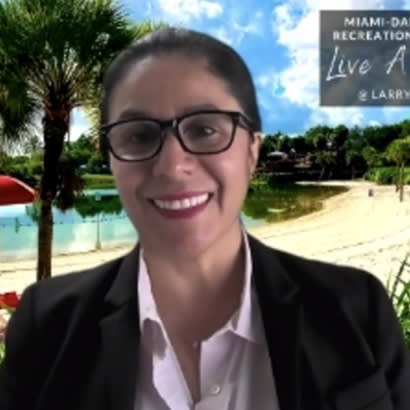
For an enhanced digital experience, read this story in the ezine.
It was Friday, March 6, 2020. The CAPRA Commission had just wrapped up a productive retreat at NRPA headquarters in Ashburn, Virginia, when suddenly the conversation quickly shifted to the growing concern about the novel coronavirus (COVID-19) and how it was going to impact NRPA activities, such as the upcoming CAPRA visit season. Commissioners expressed some concerns about what types of travel and physical distancing restrictions agencies were implementing, including some of our site visitors’ agencies. It quickly became clear that the CAPRA Commission, in partnership with NRPA staff, would have to conduct all 2020 CAPRA visits virtually. It was one thing to make that decision — it was another to figure out how that would happen. The CAPRA Commission and NRPA staff had to develop plans very quickly since visits were due to start on March 30.
The Plan
On Thursday, March 12, the CAPRA Commission sent a communication to all 2020 agencies, reviewers and visitors that instructed them to immediately halt travel arrangements for all CAPRA visits; that visits would take place virtually; and that NRPA/CAPRA would be hosting a webinar to discuss details. Positive feedback from the 2020 agencies, reviewers and visitors signaled that the CAPRA community was willing and able to make this transition, providing a much-needed confidence boost for the success of the commission’s plan. Right after sending this communication, NRPA closed its headquarters building, in response to the severity of the pandemic nationwide.
NRPA staff and the CAPRA Commission introduced their plan to 189 attendees during a March 20 webinar. Agencies would be given five days for their visits (Monday to Friday) and NRPA/CAPRA would host the kickoff and wrap up meetings via Zoom during the week. The Visit Teams received the agency self-assessment reports upon their approval, giving the teams the opportunity to start their review right away and compare notes in advance of the scheduled visit. At least seven to 10 days prior to the start of the visit, Visit Chairs provided the agencies with a list of outstanding issues and concerns that they expected the agency would need to address. NRPA/CAPRA provided each team with a Google Drive folder to help them stay organized. Visit Teams could collaborate at the same time on the final visit report and have private conversations about the visit. The agency had access to a designated folder where they could upload additional materials as requested by the Visit Team.
The Results
The Visit Teams conducted 37 virtual visits during a 19-week period from March to September. All Visit Teams included at least one first-time visitor. Park and recreation professionals are known for their creativity, and a number of agencies demonstrated that during their virtual visits. A few examples included agencies sending daily videos of specific parks and recreation centers; creating virtual backgrounds highlighting some of the parks and facilities that they described during kickoff meetings for the visit; and sharing images that described and demonstrated the unique culture of each agency.
The Feedback
The CAPRA Commission received positive feedback from staff at many of the agencies that participated in virtual visits during the COVID-19 pandemic. Katie Lockhart, outdoor education and parks manager at Garner (North Carolina) Parks, Recreation and Cultural Resources, says, “I think we may have been the first virtual visit. We could not have asked for a better experience given the circumstances. [Our Visit Team was] responsive to ideas (like scheduling a full-staff Zoom call, so they could meet our team). They communicated their needs effectively. I feel like we all worked well together, and that made the process pretty painless. Obviously, we all missed out on some of the benefits that come with an in-person visit, but our agency was pleased with how our virtual visit went.” Chris Smith, deputy director of Grapevine (Texas) Parks and Recreation, a newly accredited agency, says, “All things taken into consideration, Grapevine was very honored to be part of the process and is extremely grateful that NRPA and the commission [were] willing to adjust and face the challenge in a brand new way rather than delaying the process. This is an example that reinforces [that] NRPA is willing to evolve and make adjustments as needed to produce the outcome being desired.”
Those on the Visit Team also felt positive about the transition to a virtual process. According to Jill Korsok, director of Orange Community Education and Recreation in Pepper Pike, Ohio, and first-time visitor, the process with Reston (Virginia) Community Center “went as smoothly as it could have in mid-May. I was fortunate to have two very experienced visitors on my team to offer guidance and reflection on their experiences in previous visits….I was very glad that we were able to make contact with the agency a few days prior to the beginning of our visit to review the information they provided and begin to formulate what we needed to ask them for. They were working under incredibly unusual circumstances with limited access to files, documents, other agency partners, etc., and the extra time was a positive thing for all of us.”
The Future
It has been almost a full year since NRPA and the CAPRA Commission started down this path, and, sadly, the COVID-19 pandemic is still with us. Given both the public health emergency and economic realities, virtual CAPRA visits likely will remain a part of the process for some time to come. Thanks to the professionalism of the CAPRA Commission and Visit Teams, we learned along the way. The collected feedback from everyone involved will ensure the process of accrediting park and recreation agencies will continue to improve in 2021 and beyond.
Jennifer Schleining is NRPA's CAPRA Accreditation Manager.

